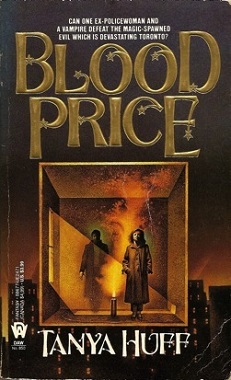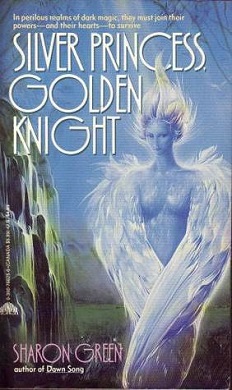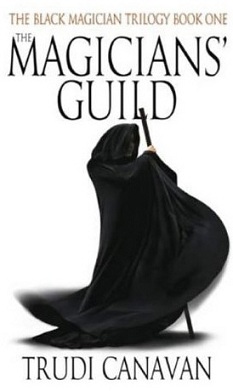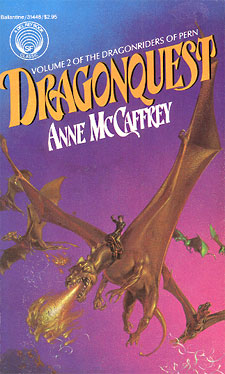
Blood Price
Tanya Huff
272 pages
published in 1991
Tanya Huff has quickly has become one of my favourite authors, ever since I first read Valor’s Choice two years ago. Which is why when the local secondhand bookstore turned out to have her entire Blood… urban fantasy series, I bought them all. Urban fantasy is a subgenre I can take or leave, but Huff is one of those writers of who I’ll read anything she writes. So far her novels have always been at least entertaining; Blood Price is no exception.
Vicky “Victory” Nelson is, retired from the Toronto police for health reasons, now turned private eye, is taking the subway home one night when she hears a terrible scream coming from the other platform and sees a man slumbed to the floor, dead. Taking a gamble as a train arrives, she sprints over the track to the other side to see that he’s had his throat ripped out and a shadowy figure disappearing down the underground. What Vicky witnessed is the first in what would become known as the Toronto vampire murders, as in quick succession several more people are killed this way, throat slashed and drained of blood. Though interested in the murders out of old police instincts, Vicky knows it’s not her problem anymore, not until the lover of the first victim hires her to find the vampire, as the police “insist on looking for a man”.
Meanwhile Henry Fitzroy has more personal reasons to be interested in this socalled vampire killer. He knows firsthand how dangerous the idea of a vampire loose in the city can be, not just for its victims, but also for any other vampires living in Toronto, vampires like himself. As you may have guessed from his name, Henry is the bastard son of a famous English king, Henry VIII, who was turned by his vampire lover and currently lives the life of a harmless if strangely nocturnal romance novelist. Over the centuries he, like every other vampire who wants to survive their first century, has learned to tame his bloodlust, rarely killing, merely taking enough to sustain himself and when killing to do so in much less …spectacular ways.
Inevitably they team up, once they both meet at the same time the killer strikes its latest victim. By then it becomes clear that it is not a vampire, but rather a demon they’re hunting. And if there’s a demon, somebody must be summoning it. To work together therefore makes sense: Vicky to sleuth around by day, Henry to stalk by night. Complicating matters is Vicky’s old police partner, friend and occasional lover, Mike Celluci, who has never forgiven her for chickening out the force, as he saw it. Vicky meanwhile is still resentful that her progressively worsening vision and night blindness had forced her to do so.
Compared to the Valor books, the characters here are slightly less threedimensional, both Vicky and Mike immediately familiar from cop tv series and hardboiled detectives. At times Blood Price reads more like a television script than a proper novel, which is sort of fitting as it was actually turned into a telly series a few years ago. Henry Fitzroy’s backstory meanwhile is told through various flashbacks and again is slightly stereotypical, the suave gentleman-vampire with the mesmeric effect on the ladies, a bit effete but much tougher than he looks at first.
That slightly stereotypical feel to the characters does start to disappear somewhat though during the course of the novel, with all three becoming slightly rounder characters. Huff luckily doesn’t go for the obvious solution for Vicky’s handicap, ie making her into a vampire or something stupid like that. She’s not invulnerable nor is she made invulnerable, but neither is she a damsel in distress.
In all Blood Price is a good entertaining romp with the occasional inspired flash of something deeper, as when an innocent night nurse is lynched on suspicion of being a vampire midway through the story. I also like the sense of place Huff gives Toronto, it feels like a proper city, rather than just a backdrop.



